Solar power steps up to meet energy demand caused by heatwave
The UK’s recent heatwave has created a surge in energy consumption.

The UK’s recent heatwave has created a surge in energy consumption.
Fortunately, the high levels of solar power capacity has helped to meet this demand, reducing the need to call on carbon intensive coal and gas plants.
According to analysis from Imperial College London, demand during the start of the heatwave on 23 June increased by 860 megawatts, the equivalent of an extra 2.5 million households requesting more power.
A steady increase of 1 degree over 20 degrees will see an extra 350 megawatts of demand, according to the researchers.This is mainly caused by a flood of air conditioner units and commercial freezers being turned up.
July temperatures hit 35 degrees last week, close to the all-time record of 38.5 degrees set in 2003.
However, renewables have been equal to the challenge, and prolonged periods of sunshine have helped bolster solar supplies. At midday last Friday, solar power accounted for 17 percent of Britain’s electricity supply, according to data from the National Grid and Sheffield University.
This is typical for the past month where Britain’s 12.8 gigawatts of solar capacity helped beat records for weekly and consecutive day production. During the end of June, 533 gigawatt hours were generated; five of the seven days also produced over 75 gigawatt hours.
Lead author Dr Iain Staffell at Imperial College London, said: “As the temperature rises, we use more cooling technology – that’s everything from office air conditioning, to fans, all of which use electricity. Places like supermarkets, with their large freezer sections, are some of the biggest energy users – as the temperature hots up, everything has to work that bit harder to keep cool.
He also drew attention to reports that the global demand for cooling technology is only set to increase, especially in countries, such as India and China.
“Thankfully, we’re able to provide electricity for cooling that’s relatively low in carbon thanks to this solar technology – it’s still the winter months that are the most carbon intensive as we need to ramp up gas and coal generation,” he added.
Andy Koss, CEO of Drax Power, which commissioned the work, said: “It’s no surprise that the recent heatwave has equated to a surge in demand. The summer months are much greener in terms of electricity production thanks to the country’s reliance on renewables, but the challenge of balancing the system is very real.”
Photo Credit: Nigel Mykura/CC






